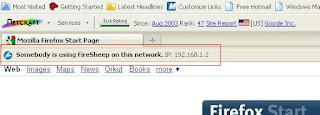Beware! Now even any Jack can hijack your session with a new Firefox plugin tool- Firesheep. All what he needs to do is to just install this tool in Firefox and start sniffing the communications on a public unencrypted Wi-Fi. Public Wi-Fi systems are generally unencrypted at Airports, Cafes etc.
Some web sites like Facebook serves the login page on https but all the internal pages at http, once authenticated. That makes this kind of websites more prone to sniffing, and an unencrypted Wi-Fi adds more problems. After authentication this kind of websites generally assigns some session identifiers to the user which can be easily sniffed and can be used to impersonate.
Surely, it's not a new concept, but what makes Firesheep more dangerous is that it's just a click-and-hijack tool that a novice user can also use at the public places to sniff other's credentials. The author's of this tool wanted to draw attention of people on those kind of websites which don't implement HTTPS fully for whole site. Hotmail took the lesson and recently added HTTPS for its whole site.
So, the main caution one should practice is to access the sites on HTTPS rather than HTTP. For the sites who don't use HTTPS all the time, don't browse them using public Wi-Fi's. There are lots of plugins available for Firefox like 'ForceHTTPS' which can be used to access the sites on HTTPS only.
Recently Zscalar released a tool 'Blacksheep' which you can use to detect the Firesheep, if somebody is using it in your network. BlackSheep is a Firefox add-on which warns users if someone is using Firesheep on their network. It also indicates the IP address of the machine that is spying on you.It periodically sends some fake session IDs similar to the sites like Facebook, and when Firesheep starts to capture it, it detects it and shows user the warning (See pic below).
But safe option use HTTPS all the time, if possible and don't browse to sensitive sites in public places. Be safe!
Sample screen shot of Blacksheep in action on my machine:

Some web sites like Facebook serves the login page on https but all the internal pages at http, once authenticated. That makes this kind of websites more prone to sniffing, and an unencrypted Wi-Fi adds more problems. After authentication this kind of websites generally assigns some session identifiers to the user which can be easily sniffed and can be used to impersonate.
Surely, it's not a new concept, but what makes Firesheep more dangerous is that it's just a click-and-hijack tool that a novice user can also use at the public places to sniff other's credentials. The author's of this tool wanted to draw attention of people on those kind of websites which don't implement HTTPS fully for whole site. Hotmail took the lesson and recently added HTTPS for its whole site.
So, the main caution one should practice is to access the sites on HTTPS rather than HTTP. For the sites who don't use HTTPS all the time, don't browse them using public Wi-Fi's. There are lots of plugins available for Firefox like 'ForceHTTPS' which can be used to access the sites on HTTPS only.
Recently Zscalar released a tool 'Blacksheep' which you can use to detect the Firesheep, if somebody is using it in your network. BlackSheep is a Firefox add-on which warns users if someone is using Firesheep on their network. It also indicates the IP address of the machine that is spying on you.It periodically sends some fake session IDs similar to the sites like Facebook, and when Firesheep starts to capture it, it detects it and shows user the warning (See pic below).
But safe option use HTTPS all the time, if possible and don't browse to sensitive sites in public places. Be safe!
Sample screen shot of Blacksheep in action on my machine:

Comments